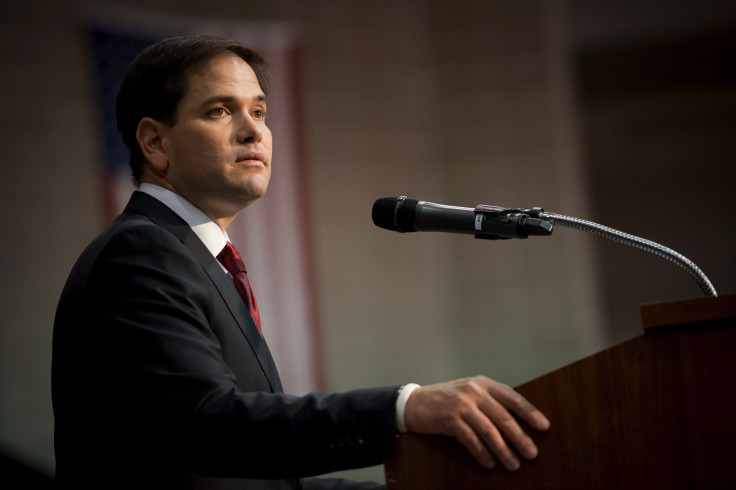Marco Rubio Promoted Core Tenets Of Obamacare And Obama Energy Policies

As he announced his presidential campaign in April, Florida Sen. Marco Rubio promised to “repeal and replace Obamacare.” Rubio has been advocating repeal since 2013, helping him build support among the GOP’s conservative base that is key to winning Republican presidential primaries. Yet only a few years before he was elected to the U.S. Senate, Rubio was aggressively promoting some of the core policies of the Affordable Care Act.
In 2006, Rubio released a book called “100 Innovative Ideas for Florida’s Future.” In the book’s section on healthcare, Rubio decried the fact that “more than 3 million Floridians lack health insurance and may face barriers in accessing needed health services.” As a solution, Rubio pressed to expand government-run healthcare programs and create an insurance exchange -- both core tenets of Obamacare.
For instance, he lamented that at one government-funded health program in Florida “enrollment has dropped by over 130,000 from its peak several years ago, primarily due to the tightening of eligibility screening procedures.” When it came to the government-run State Child Health Insurance Program, Rubio criticized the fact that “Florida has underspent its federal SCHIP allocations by more than $450 million.”
Rubio also touted other government-run health programs in Florida, writing: “A variety of programs and services exist to meet the healthcare needs of low-income and uninsured residents. These efforts include Florida KidCare, the Florida Health Insurance Plan, Health Flex, community-based free clinics, and other safety-net programs. The state should expand these efforts.” He added: “Florida should make it easier for qualified, uninsured children to get coverage through Florida KidCare.”
As for private insurance, Rubio said, “Florida should launch a marketplace of affordable health insurance.” He also wrote that “to further jumpstart this program, the state could also provide a partial subsidy for a limited number of qualified subscribers.”
Two of the key tenets of the ACA -- which is anathema to conservatives -- are the expansion of state-based Medicaid programs and the creation of insurance exchanges.
Rubio has slammed the Obama administration’s energy policy. In his 2013 State of the Union rebuttal, he said that “solar and wind energy should be a part of our energy portfolio” but that “God also blessed America with abundant coal, oil and natural gas.” He attacked the Obama administration for “wasting more taxpayer money on so-called clean energy companies like Solyndra.” But Rubio’s 2006 book criticized reliance on fossil fuels and supported renewable energy initiatives.
In one section, he wrote that government should “promote the development and use of alternative energy sources” and argued that “substitution of alternative energy sources for fossil fuels is critical to reducing our dependence on imported oil.” He also expressed concern about a potential “overreliance” on fossil fuels, noting that “fossil fuels represent 86 percent” of Florida’s energy generating capacity. He declared that “dependence on oil jeopardizes Florida’s continued economic prosperity” and said that Florida should “build energy-efficient buildings that meet environmental standards.”
The Florida GOP spent roughly $575,000 to promote Rubio’s book, according to the Palm Beach Post. Rubio also set up a nonprofit to promote it.
The book’s promotion of themes echoed by Obama could intensify recent efforts by Rubio’s rivals to peel away conservative voters flocking to his campaign. Former Florida Gov. Jeb Bush’s campaign in particular recently called Rubio "a GOP Obama."
There’s just one problem for Bush: He backed Rubio’s book with a back-cover endorsement and a foreword.
© Copyright IBTimes 2024. All rights reserved.






















